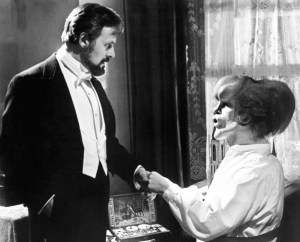David Lynch, whose death was announced Thursday, was my motion picture lodestar.
When his 1977 movie Eraserhead played at an obscure film festival, now long gone, in Woolwich, London, it was like nirvana for a kid raised on The Sound of Music, Cliff Richard in Summer Holiday and Tommy Steele in Half a Sixpence!
It was my kind of weirdness. Thank heavens my sister loved Bob Dylan, otherwise I’d have been really weird.
I was getting high on Lynch’s movies, and the price of admission at the Odeon in Richmond was all it cost me.
A few years later, as a reporter on the London Evening Standard, I was charged with tracking the progress of The Elephant Man, the film Lynch was shooting about John Merrick starring John Hurt, Anthony Hopkins, Anne Bancroft and John Gielgud. They were on location at a crumbling old wing — so dilapidated that it later was demolished — of the London Hospital in Whitechapel.
Anthony Hopkins and John Hurt in ‘The Elephant Man’
Paramount Pictures/Everett Collection
To state the obvious, in those days a Black guy on set would’ve stood out, so I managed to get a hospital porter’s garb and, pretending to be lost, I waltzed over to where they were shooting and managed to catch a glimpse of Lynch with Hurt. They spotted me, and I meekly explained that I’d lost my way. I weakened and confessed my sin. and Lynch kindly told me that while he admired my tenacity, I should scoot away.
But David Lynch spoke to me! That was a result to a young whippersnapper.
RELATED: Hollywood Pays Tribute To David Lynch: Ron Howard, Sting, Judd Apatow & Others Remember
A few years later, when he was in town promoting Blue Velvet, I got to interview him, this time legitimately.
He asked if we’d met before. I told him about my little East London run-in with him on The Elephant Man.
He sat back and roared with laughter.
It was during that interview that I asked him what has now become a signature question that, to this day, I often roll out just to see if I can be surprised.
I wanted to know what it was that he saw from his bedroom window when he was a boy. There must have been something that sparked his vivid imagination?
“Well,” he drawled, “I wanted to know what was in the trees beyond the house. What lurked there. It opened up so many possibilities. Were there monsters having coffee or tea? What kind of weirdness was lurking out there? It sets you thinking, you see, and you build on that. You can construct a story out of just imagining what’s out there. And the imagination is limitless.”
His statement was like a key to unlocking my own perceptions of how cinema can release unlimited interpretations and feelings.
Strangely enough, I’d been thinking about Lynch a lot lately.
I saw Blue Velvet stars Isabella Rossellini and Kyle MacLachlan leaving the Beverly Hilton ballroom after the Golden Globes.

Isabella Rossellini in ‘Blue Velvet’ (De Laurentis Group/Courtesy Everett Collection)
John Magaro, star of September 5, screamed,” It’s the Blue Velvet reunion!”
I whipped out my camera and shot a few seconds of video of them, suddenly finding myself hurled back nearly four decades to when I interviewed them as well for Blue Velvet. That film blew my mind. Like, what was Dennis Hopper inhaling in that gas mask?
So I owe Lynch profound thanks. He opened up possibilities for me in how I watched movies.
He uncoupled me from this sense, born out of my strait-laced English side — now banished, my Nigerian side is wilder — that I watch only wholesome movies. Well, I could do that too, but I wanted a shot of adrenaline pumped straight to the heart, which is how it felt when I saw Wild at Heart at the 1990 Cannes Film Festival. It was outrageously dirty and wild, showing America flipped over on its underbelly.
Some critics and film reporters at the early-morning press screening booed. I cheered. I was like, “Wow!”
It won the Palme D’Or.
David Lynch proved that you can never un-see what’s lurking beyond your bedroom window.
Thank you for opening my eyes, Mr. Lynch.

